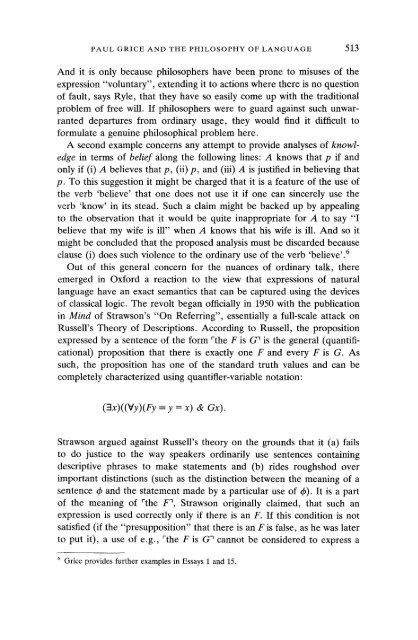Paul Grice and the philosophy of language
Paul Grice and the philosophy of language
Paul Grice and the philosophy of language
You also want an ePaper? Increase the reach of your titles
YUMPU automatically turns print PDFs into web optimized ePapers that Google loves.
PAUL GRICE AND THE PHILOSOPHY OF LANGUAGE 513<br />
And it is only because philosophers have been prone to misuses <strong>of</strong> <strong>the</strong><br />
expression "voluntary", extending it to actions where <strong>the</strong>re is no question<br />
<strong>of</strong> fault, says Ryle, that <strong>the</strong>y have so easily come up with <strong>the</strong> traditional<br />
problem <strong>of</strong> free will. If philosophers were to guard against such unwarranted<br />
departures from ordinary usage, <strong>the</strong>y would find it difficult to<br />
formulate a genuine philosophical problem here.<br />
A second example concerns any attempt to provide analyses <strong>of</strong> knowledge<br />
in terms <strong>of</strong> belief along <strong>the</strong> following lines: A knows that p if <strong>and</strong><br />
only if (i) A believes that p, (ii) p, <strong>and</strong> (iii) A is justified in believing that<br />
p. To this suggestion it might be charged that it is a feature <strong>of</strong> <strong>the</strong> use <strong>of</strong><br />
<strong>the</strong> verb 'believe' that one does not use it if one can sincerely use <strong>the</strong><br />
verb 'know' in its stead. Such a claim might be backed up by appealing<br />
to <strong>the</strong> observation that it would be quite inappropriate for A to say "I<br />
believe that my wife is ill" when A knows that his wife is ill. And so it<br />
might be concluded that <strong>the</strong> proposed analysis must be discarded because<br />
clause (i) does such violence to <strong>the</strong> ordinary use <strong>of</strong> <strong>the</strong> verb 'believe'. 6<br />
Out <strong>of</strong> this general concern for <strong>the</strong> nuances <strong>of</strong> ordinary talk, <strong>the</strong>re<br />
emerged in Oxford a reaction to <strong>the</strong> view that expressions <strong>of</strong> natural<br />
<strong>language</strong> have an exact semantics that can be captured using <strong>the</strong> devices<br />
<strong>of</strong> classical logic. The revolt began <strong>of</strong>ficially in 1950 with <strong>the</strong> publication<br />
in Mind <strong>of</strong> Strawson's "On Referring", essentially a full-scale attack on<br />
Russell's Theory <strong>of</strong> Descriptions. According to Russell, <strong>the</strong> proposition<br />
expressed by a sentence <strong>of</strong> <strong>the</strong> form ~<strong>the</strong> F is G ~ is <strong>the</strong> general (quantificational)<br />
proposition that <strong>the</strong>re is exactly one F <strong>and</strong> every F is G. As<br />
such, <strong>the</strong> proposition has one <strong>of</strong> <strong>the</strong> st<strong>and</strong>ard truth values <strong>and</strong> can be<br />
completely characterized using quantifier-variable notation:<br />
(3x)((Vy)(Fy =- y = x) & Gx).<br />
Strawson argued against Russell's <strong>the</strong>ory on <strong>the</strong> grounds that it (a) fails<br />
to do justice to <strong>the</strong> way speakers ordinarily use sentences containing<br />
descriptive phrases to make statements <strong>and</strong> (b) rides roughshod over<br />
important distinctions (such as <strong>the</strong> distinction between <strong>the</strong> meaning <strong>of</strong> a<br />
sentence 4) <strong>and</strong> <strong>the</strong> statement made by a particular use <strong>of</strong> ~b). It is a part<br />
<strong>of</strong> <strong>the</strong> meaning <strong>of</strong> r<strong>the</strong> F 7, Strawson originally claimed, that such an<br />
expression is used correctly only if <strong>the</strong>re is an F. If this condition is not<br />
satisfied (if <strong>the</strong> "presupposition" that <strong>the</strong>re is an F is false, as he was later<br />
to put it), a use <strong>of</strong> e.g., r<strong>the</strong> F is G 7 cannot be considered to express a<br />
6 <strong>Grice</strong> provides fur<strong>the</strong>r examples in Essays 1 <strong>and</strong> 15.














